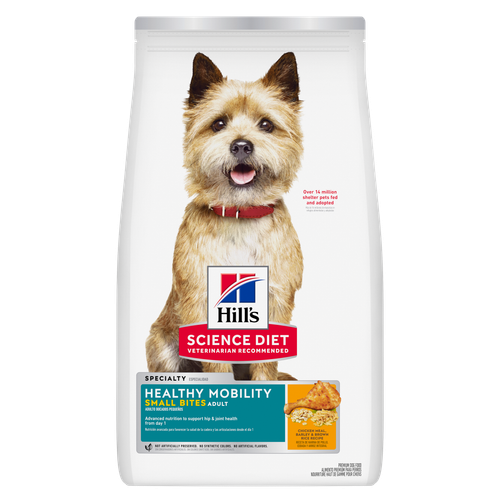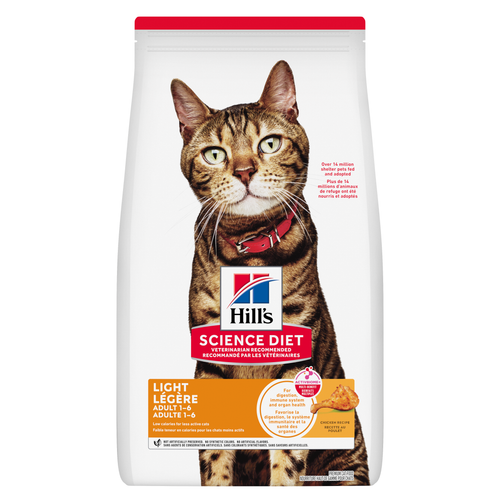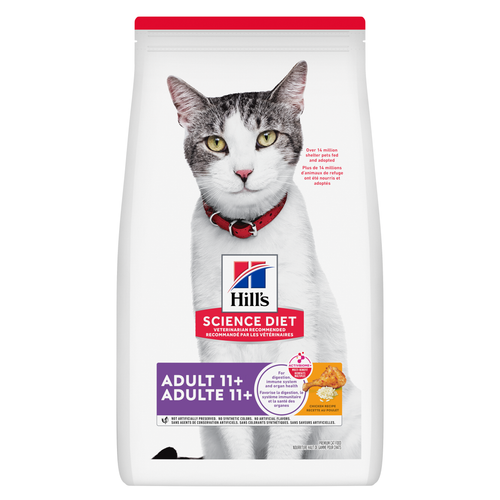
-
Find the right food for your petTake this quiz to see which food may be the best for your furry friend.Find the right food for your petTake this quiz to see which food may be the best for your furry friend.Featured products
 Adult Healthy Mobility Small Bites Chicken Meal, Barley & Brown Rice Recipe Dog Food
Adult Healthy Mobility Small Bites Chicken Meal, Barley & Brown Rice Recipe Dog FoodAdvanced nutrition to support hip & joint health from day 1
Shop Now Adult Sensitive Stomach & Skin Small & Mini Chicken Recipe Dog Food
Adult Sensitive Stomach & Skin Small & Mini Chicken Recipe Dog FoodHill's Science Diet Sensitive Stomach & Skin Small & Mini dry dog food is tailored nutrition for Small & Mini dogs while being gentle on stomachs. Nourishes skin & promotes a lustrous coat.
Shop Now Adult Light Large Breed Chicken Meal & Barley Recipe Dog Food
Adult Light Large Breed Chicken Meal & Barley Recipe Dog Food18% lower calories vs. Science Diet Large Breed Adult
Shop NowFeatured products Adult Healthy Cuisine Seared Tuna & Carrot Medley Cat Food
Adult Healthy Cuisine Seared Tuna & Carrot Medley Cat FoodDelicious seared tuna paired with tender carrots in a mouthwatering sauce
Shop Now Adult Light Chicken Recipe Cat Food
Adult Light Chicken Recipe Cat Food20% lower calories vs. Hill's Science Diet Adult
Shop Now Adult 11+ Chicken Recipe Cat Food
Adult 11+ Chicken Recipe Cat FoodSupports brain health & beautiful fur. Helps keep immune system, heart & kidneys healthy.
Shop Now -
Dog
- Dog Tips & Articles
-
Health Category
- Weight
- Food & Environmental Sensitivities
- Urinary
- Digestive
- Joint
- Kidney
- Dental
- Cancer
-
Life Stage
- Puppy Nutrition
- Adult Nutrition
- Senior Nutrition
Cat- Cat Tips & Articles
-
Health Category
- Weight
- Skin & Food Sensitivities
- Urinary
- Digestive
- Kidney
- Dental
- Stress
- Cancer
-
Life Stage
- Kitten Nutrition
- Adult Nutrition
Featured articles Importance of DHA in your Pet's Food
Importance of DHA in your Pet's FoodLearn about DHA, Docosahexaenoic Acid, a natural omega-3 fatty acid that is essential in the development of the brain and nervous system in cats & dogs.
Read More Water
WaterDiscover why water is the most important nutrient for your dog or cat to live a healthy life. Find out how much water your pet should consume each day.
Read More Antioxidants
AntioxidantsUnderstand the importance of antioxidants in your dog or cat's food, and how they can help protect your pet and keep them healthy.
Read More -


What's better than one new puppy or kitten? Two! If you're headed to the shelter to adopt a new family member, you might encounter dog siblings or cat siblings housed in a kennel together. The staff may offer the option to adopt two together. But should they be adopted as a team, or is it better to separate littermates? Let's take a closer look at this common pet adoption question.

Should I Adopt Littermates?
If you're in the market for multiple furry family members, you might wonder whether it's a good idea to select two pets from the same litter. Applied Animal Behaviorist Patricia McConnell, PhD explains that many potential pet parents don't want their new pet to be lonely, so they will often get two pets from the same litter. After all, they've socialized with one another from the start and likely already get along.
However, Dr. McConnnell says that littermates are often so engrossed in what their sibling is doing that it's harder to get them to focus on you — ultimately, making them more difficult to train. Sometimes as the pets grow and mature, they begin to bully one another to vie for human attention. And sibling bonding is a different connection than a long-term bonded pair of pets who have lived together for years. Those pairs absolutely need to stay together to avoid bouts of anxiety or depression.
Already have littermates in your home? One-on-one training sessions, making the siblings sleep in different areas and playing with each pet individually can help to reduce sibling rivalry. Also consider hiring a pet trainer or behaviorist to help provide guidance and training for this unique situation



Tasty Tips
Young pets may need several visits in their first year for vaccinations. Adult pets generally benefit from annual check-ups, while senior or special-needs pets might require more frequent visits.
When to Adopt Individual Pets
During a pet adoption, you become the new best friend of that cat or dog. The pet will adjust and handle the separation from their siblings just fine over time. Therefore, if you're hoping to claim your new cat or dog's full attention, adopting littermates may not be right for you. Sure, the animals may feel a little sad leaving their brothers and sisters, but those feelings will quickly dissipate as the pet falls in love with their new pet parents and their existing pet family members.
Consider adopting individual pets. If you really want two, choose pets that aren't from the same litter. Work slowly to introduce the new pets to be sure they're compatible before taking them home, and if the two seem to hit it off, go forward with the adoption. You and the new pets will work through the adjustment period together and form a bond as a family.
As you begin looking around for your new cat or dog, be ready to encounter a potential double adoption. Rescues and shelters often receive litters of puppies and kittens and may offer dog siblings or cat siblings to you, especially if you're in the market to add more than one pet to your clan. If you really have your heart set on adopting littermates, great! Just make sure you treat them as individuals and give them their own special attention and training to help them grow up to be well-behaved social creatures. If you decide to stick with just one pet for now, that's okay, too. You always have the option of adopting a brother or sister for them in the future.


Angela Tague is a pet mom and writer living in the Midwest. When she's not making a mess in the kitchen, exploring nature trails with her dog, or attending a yoga workshop, she's writing full-time for multiple lifestyle and technology brands. You can find her on Twitter and LinkedIn @AngelaTague.
Related products

Advanced nutrition to support hip & joint health from day 1

Supports brain health & beautiful fur. Helps keep immune system, heart & kidneys healthy.

18% lower calories vs. Science Diet Large Breed Adult

Hill's Science Diet Sensitive Stomach & Skin Small & Mini dry dog food is tailored nutrition for Small & Mini dogs while being gentle on stomachs. Nourishes skin & promotes a lustrous coat.
Related articles

Discover how and where to store your dry, as well as canned, dog and cat food. Learn how to find the "best before" dates on all Hill's pet food packaging.

Understand the importance of antioxidants in your dog or cat's food, and how they can help protect your pet and keep them healthy.

Learn about DHA, Docosahexaenoic Acid, a natural omega-3 fatty acid that is essential in the development of the brain and nervous system in cats & dogs.

Discover why water is the most important nutrient for your dog or cat to live a healthy life. Find out how much water your pet should consume each day.

Put your pet on a diet without them knowing
Our low calorie formula helps you control your pet's weight. It's packed with high-quality protein for building lean muscles, and made with purposeful ingredients for a flavorful, nutritious meal. Clinically proven antioxidants, Vitamin C+E, help promote a healthy immune system.
Put your pet on a diet without them knowing
Our low calorie formula helps you control your pet's weight. It's packed with high-quality protein for building lean muscles, and made with purposeful ingredients for a flavorful, nutritious meal. Clinically proven antioxidants, Vitamin C+E, help promote a healthy immune system.

